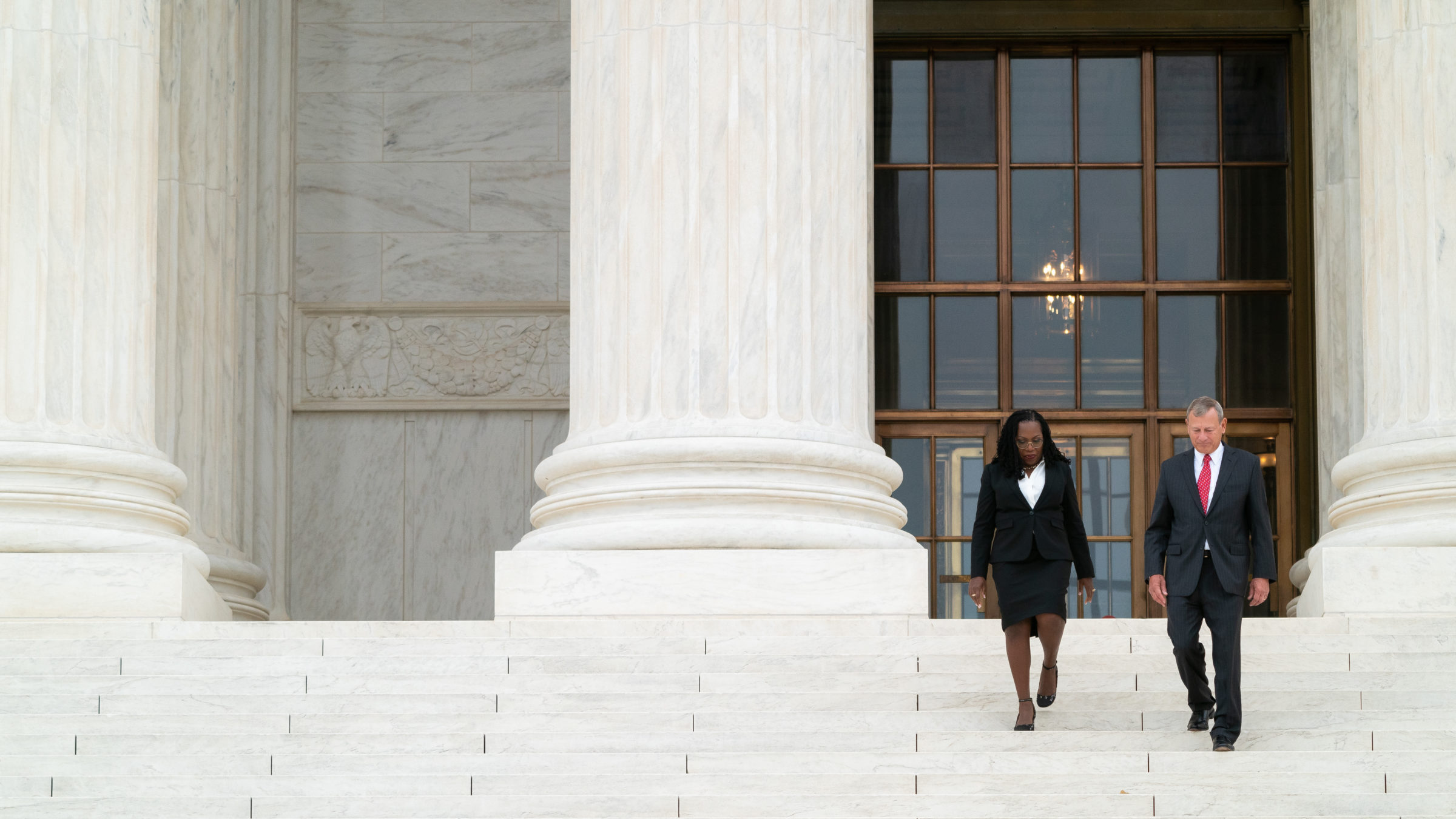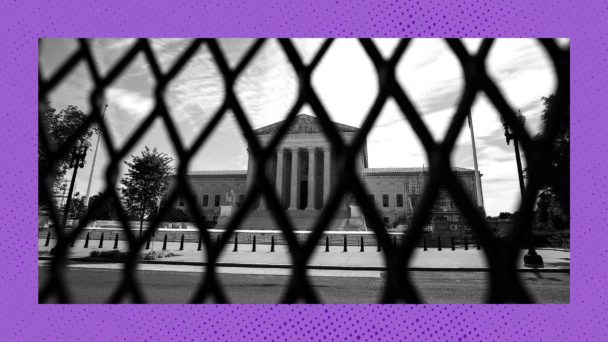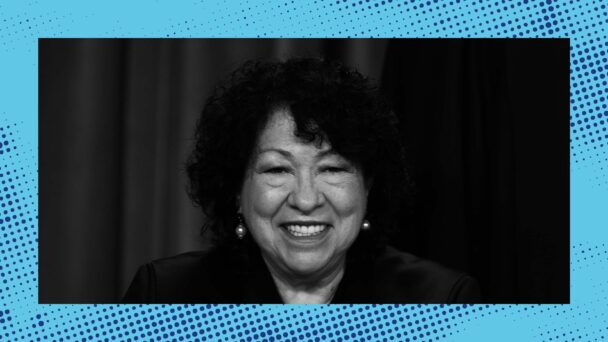The Supreme Court’s newest member, Justice Ketanji Brown Jackson, debuted at oral argument this week, and very quickly got under the skin of the conservative legal commentariat.
Merrill v. Milligan is the latest in a long line of cases brought by conservatives aiming to slowly bleed the Voting Rights Act of 1965 to death. The law—an effort to restrict racial discrimination in voting—is a thorn in the side of Republicans, primarily due to their desire to engage in racial discrimination in voting. As a result, the Republicans on the Supreme Court have kneecapped the law at every turn, limiting its applicability and undermining the mechanisms it created to combat voter discrimination.
Merrill is a challenge to Alabama’s gerrymandered congressional districts, which leave Black voters—over a quarter of Alabama’s population—with majority voting power in only one of the state’s seven districts. That arrangement almost certainly violates Section 2 of the Voting Rights Act, which prohibits states from abridging the right to vote on the basis of race.
In its defense, Alabama has advanced an aggressive argument: that although Congress enacted the Voting Rights Act to combat racial discrimination, race cannot be considered at all in its enforcement. That, according to Alabama, would violate the 14th Amendment’s guarantee of equal treatment under the law. If this argument were accepted in full, the government could not factor race into its remedial plans, even if their goal is ultimately racial equality.
The argument is so inherently absurd that it bears repeating: Alabama is claiming that it is unconstitutional to consider race when addressing racial discrimination. Next up, addressing gun violence without considering guns.

Justice Ketanji Brown Jackson converses with voter suppression enthusiast (Photo by Elizabeth Frantz for The Washington Post via Getty Images)
During oral argument, Jackson addressed the argument head-on, saying that “the entire point of the [14th] Amendment was to secure the rights of freed slaves.” In other words, claiming that the 14th Amendment forbids race-conscious government action is not just wrong, it’s a complete inversion of the historical record, which shows that the amendment itself was a race-conscious effort to create parity between black and white citizens. To hammer the point home, Jackson pointed to the words of the Joint Committee on Reconstruction as well as the text of the Civil Rights Act of 1866, both of which made clear that the goal was not race-neutrality as a general principle, but in particular the equality of freed slaves.
Jackson’s clear, common-sense refutation of Alabama’s position drew some applause from liberal court watchers, happy to see the progressive view of the Reconstruction Amendments articulated at the high court. It also drew some defensive posturing from the right, starting with Ed Whelan, a former clerk to Justice Antonin Scalia. Whelan is best known for a 2018 debacle where, in an attempt to defend Brett Kavanaugh from Christine Blasey Ford’s sexual assault allegations, he crafted a lengthy Twitter thread accusing one of Kavanaugh’s prep school classmates of being the true perpetrator based on his analysis of old yearbook photographs and some home floor plans he pulled from Zillow.
In a just world, this ordeal would have left Whelan unemployed, divorced, and stripped of all lands and titles. In our world, however, he writes for the National Review. And in his coverage of Merrill, Whelan claims not to understand Jackson’s “leap” from the race-conscious origins of the 14th Amendment to her belief that the amendment allows for race-conscious solutions to discrimination. He argues that the purpose of the amendment was to broadly eliminate any differential treatment on the basis of race, rather than specifically ameliorating the rampant discrimination against recently freed Black people.
“By its plain text,” Whelan writes, “the 14th Amendment ensures that states…shall not deny any person the ‘equal protection of the laws,’ irrespective of the person’s race.” The italicized language is not in the Constitution, but was added by Whelan, who apparently felt the “plain text” needed some supplementing.

This is a picture of Ed Whelan, NOT of a Picture of Dorian Gray-style portrait that Stephen Miller keeps in his attic (Photo by Scott J. Ferrell/Congressional Quarterly/Getty Images)
National Review editors apparently found this argument compelling, as they published a lightly repackaged version of it the next day, this time authored by Carrie Campbell Severino and Frank Scaturro, both of whom work for the right-wing Judicial Crisis Network. Severino and Scaturro advance the same basic argument: that the Reconstruction Amendments and related statutes from the same era had “the intent of abolishing racial distinctions in the law.” The implication, again, is that government attempts to remedy voter discrimination may themselves run afoul of the Constitution by treating voters differently based on their race.
These arguments rely on the same basic obfuscation: They conflate the goal of the 14th Amendment, equal protection under the law, with the mechanisms for reaching that goal. Jackson was pointing out that the goal of equal protection under the law is not incompatible with race-conscious remedies. Indeed, they are logical partners—if one racial group is the subject of discrimination, any solution to that discrimination will require that benefits accrue intentionally and disproportionately to that racial group.
Conservative lawyers have good reason to bristle at Jackson’s analysis. It is a longstanding project of the right-wing legal movement to strip away the historical context of the Equal Protection Clause and replace it with a general principle of “race-neutrality.” The resulting paradigm has allowed the Court to shrug at claims of systemic discrimination as lacking evidence, while arguing that race-conscious attempts to remedy discrimination are themselves discriminatory.
The Court has used this basic formulation not just to hamper the Voting Rights Act, but to hobble anti-discrimination efforts of all types. Chief Justice John Roberts famously tossed out a race-conscious school desegregation program while snarking that “the way to stop discrimination on the basis of race is to stop discriminating on the basis of race” —reasoning the Court will almost certainly reuse to dispose of state school affirmative action programs this term. Jackson’s attempt to centralize the historical context of the Reconstruction Era in discussing the Equal Protection Clause isn’t just a defense of voting rights. It’s a direct shot into the heart of the conservative view of the 14th Amendment.
Of course, on a Court controlled by a six-conservative supermajority, owning Alabama’s lawyers from the bench and irritating half-witted conservative commentators only gets you so far. It’s not clear whether oral arguments move the needle on case outcomes at all. Justice Clarence Thomas thought they were so unimportant that he famously remained silent for an entire decade, and only began speaking again when the ascendance of American fascism boosted his energy levels.
But Jackson’s performance at oral argument was a brief glimmer of what the Court needs: a concise and articulate progressive vision of the Constitution, even if it appears mainly in concurrences and dissents for the foreseeable future. Scalia, far to the right of most of his contemporaries, often found himself writing lonely dissents and concurrences in high-profile cases. Scalia claimed that he directed his writing at the next generation of law students. He realized that where he couldn’t corral five votes, he could lay the foundations so that one day someone could.
Lawyers on the left have been hopeful that Jackson could do the same for them, and help them finally gain a foothold in their struggle against the conservative legal movement. In that light, it’s easy to see why she’s already making conservatives nervous.




